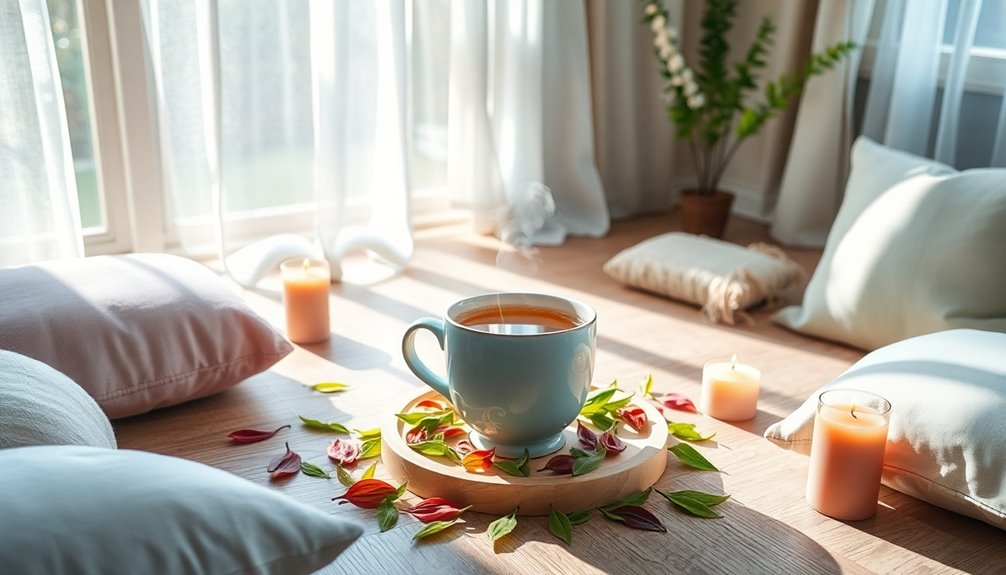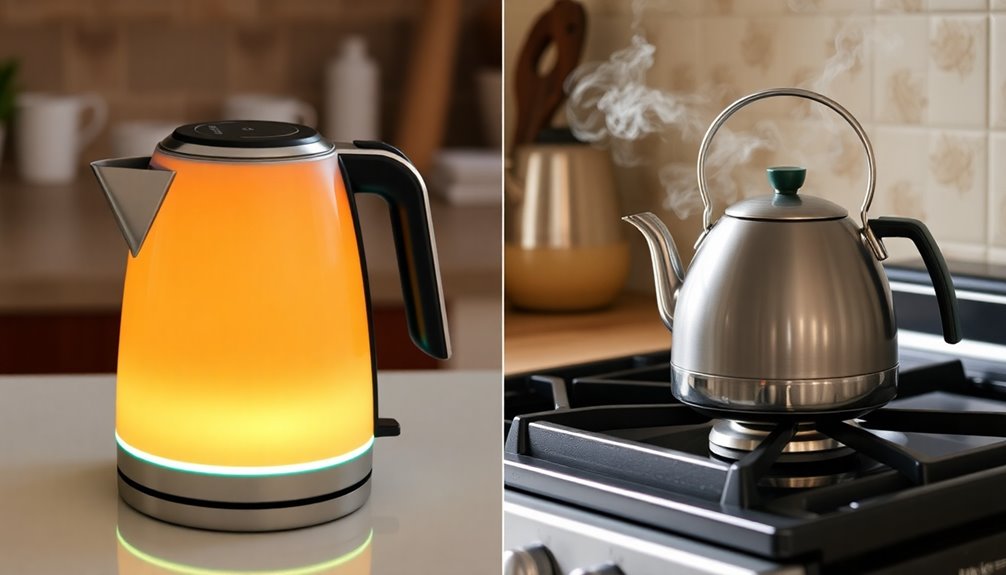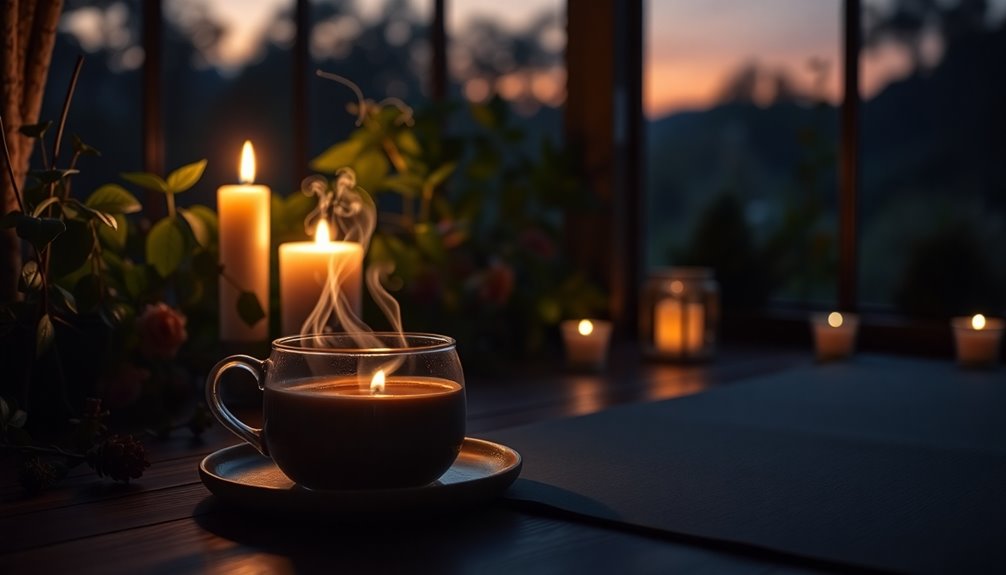To enhance your meditation practice, choose teas that promote relaxation and focus. Herbal teas like chamomile and lavender help calm your mind, while green tea, especially matcha, boosts clarity and calm alertness. Rooibos is a great caffeine-free option, soothing your senses without jitters. You can even turn tea preparation into a mindful ritual by enjoying the aroma and flavor. Remember, sipping tea can help center your thoughts before meditation. Explore different blends to find which ones resonate most with you, and you'll discover new ways to deepen your practice. Stick around, and you'll uncover even more tips!
Key Takeaways
- Herbal teas like chamomile and lavender promote calmness, reducing anxiety and enhancing the depth of meditation practices.
- Green tea, particularly matcha, contains L-theanine which boosts relaxation and mental clarity for deeper meditative states.
- Rooibos tea is caffeine-free, offering relaxation and stress relief, making it ideal for sensitive individuals during meditation.
- Engaging in mindful tea preparation and sipping enhances present-moment awareness, creating a conducive environment for meditation.
- Incorporating cultural tea rituals can deepen the meditation experience, fostering mindfulness and connection through the enjoyment of tea.
Introduction
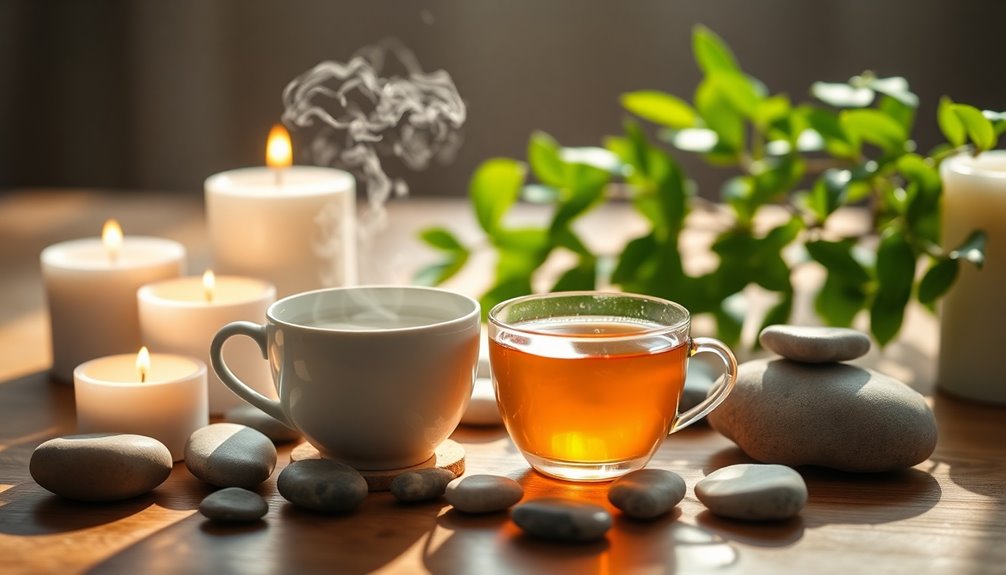
Integrating tea into your meditation routine can elevate your practice, creating a serene atmosphere that enhances relaxation and focus. Imagine the calming effect of sipping a warm cup of tea before you sit down to meditate. It's not just about the tea; it's about the whole experience. Choosing specific teas can help set the mood for your pre-meditation ritual.
Herbal teas like chamomile and lavender are perfect for their soothing aromas, promoting a sense of calm. They invite relaxation, helping you unwind and prepare your mind for meditation. Additionally, these herbal teas are known for their mood enhancement properties, making them ideal for creating a tranquil environment. Studies suggest that certain teas may also combat oxidative stress, further enhancing their calming effects. Moreover, herbal teas can be rich in antioxidants, which support overall cellular health. Turmeric, with its anti-inflammatory properties, can also be a beneficial addition to your tea selection, promoting overall well-being.
If you prefer something with a bit of energy, green tea, especially matcha, is an excellent choice. It contains L-theanine, which supports mental clarity and a calm alertness, making it easier for you to focus during your practice.
Don't forget about other herbal teas like rooibos, which are caffeine-free and packed with antioxidants. Preparing and sipping your chosen tea can be a mindfulness practice in itself, encouraging you to stay present. Additionally, teas like chamomile and ginger are known to alleviate menstrual discomfort, making them a thoughtful choice for women seeking relief during their meditation sessions.
Tea's Role in Mindfulness
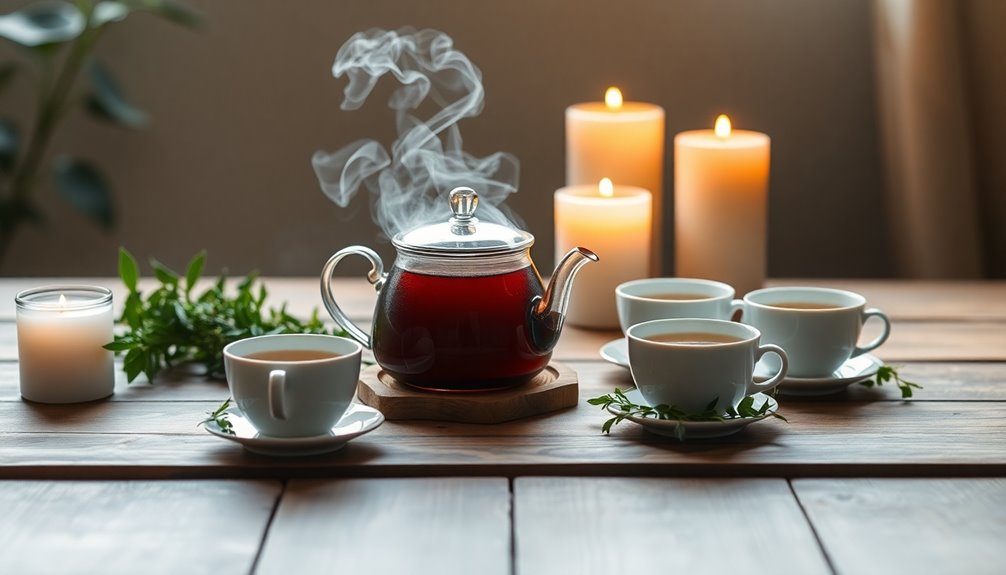
Tea plays a vital role in mindfulness, transforming the simple act of drinking into a profound experience. When you engage in a mindful ritual of tea preparation, you awaken your senses and promote present-moment awareness, enhancing your meditation experience.
Sipping tea mindfully allows you to focus on its temperature, texture, and flavor. This deepens relaxation and encourages a focused state of mind during meditation.
Integrating breath synchronization with your tea drinking can help reduce stress and enhance focus. As you enjoy your cup, take slow, deep breaths, fostering a deeper connection with your practice.
The ritual of drinking tea encourages contemplation and self-reflection, which can lead to valuable insights during meditation.
Your tea choice matters too! Selecting teas with calming properties can support your individual meditation practices, allowing tailored approaches to mindfulness and relaxation.
Whether you prefer chamomile for relaxation or green tea for mental clarity, each cup can elevate your experience.
Tea Enhances Meditation Depth
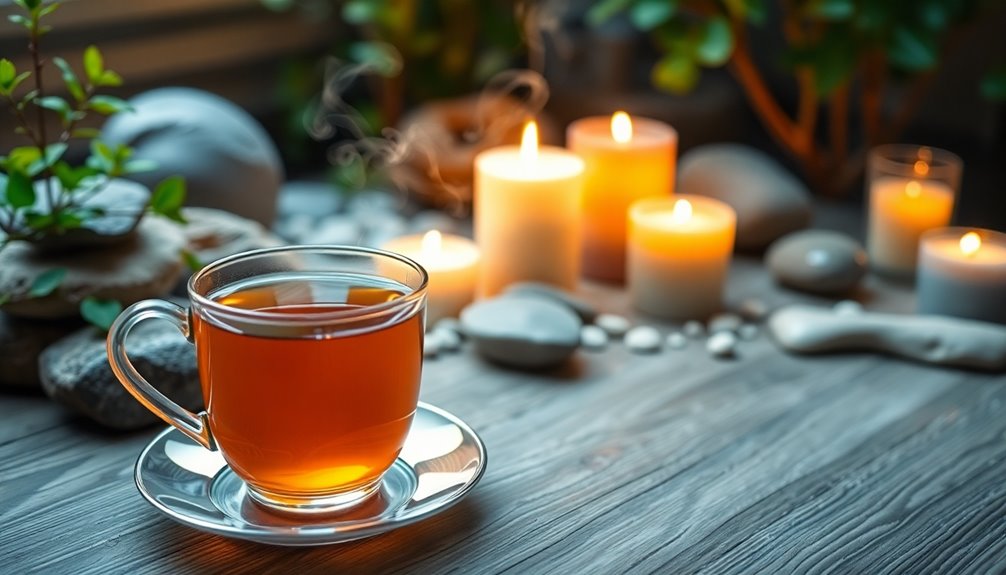
The calming effects of certain teas can significantly deepen your meditation practice. By choosing the right tea, you can enhance mental clarity and calm the mind, making your meditation sessions more fulfilling.
For instance, herbal tea like chamomile or lavender can help reduce anxiety and tension, allowing you to dive deeper into your practice. Additionally, incorporating nutrient-dense options like chia seeds can further support your mind and body during meditation. Oolong tea, known for its unique flavor profile, can also provide a soothing experience that complements your meditation routine. Furthermore, the use of essential oils like lavender can enhance the calming effects of your tea.
Green tea, especially matcha, is another excellent option. It contains L-theanine, a compound that boosts alpha brain waves linked to relaxation and improved focus. This makes it perfect for achieving deeper meditative states. Moreover, studies have shown that regular tea consumption can lead to improved cognitive function, making it a beneficial addition to your routine.
Additionally, sipping on rooibos or ginger tea not only calms the body but also keeps you hydrated, which is essential for maintaining focus and clarity during your meditation.
Incorporating tea into your routine can be an enjoyable ritual, allowing you to engage your senses and promote present-moment awareness. Herbal teas, such as chamomile and peppermint, are often used for medicinal purposes that enhance relaxation and focus.
Regular tea consumption is also scientifically shown to correlate with reduced stress levels. So, by enjoying a warm cup before you sit down to meditate, you set the stage for a profound experience that connects the mind and body, leading to greater stress relief and overall well-being.
Tea Rituals From Various Cultures
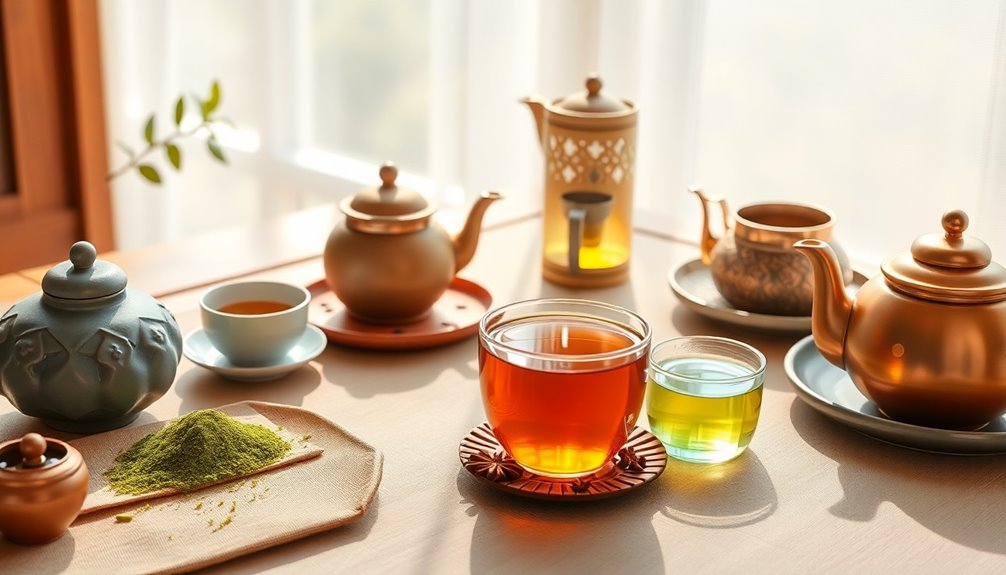
Across cultures, tea rituals offer unique experiences that enhance mindfulness and meditation. For instance, the Japanese tea ceremony, known as "Chanoyu," emphasizes the beauty in preparing and enjoying tea. This ritual creates a peaceful space, inviting you to focus on the moment and deepen your meditation practice.
In Chinese culture, the Gongfu tea ceremony is all about precision. By carefully brewing tea to extract its best flavors and aromas, you learn to savor each sip, making your meditative experience even richer.
Then there's the Indian Chai ritual, where spiced tea is brewed with love, filling the air with inviting scents that promote relaxation and connection.
The Moroccan tea ritual is another delightful experience, where pouring mint tea from a height symbolizes hospitality. This shared act encourages mindfulness and reflection among participants.
Lastly, Tibetan tea ceremonies often feature butter tea, which provides warmth and nourishment, grounding you as you meditate.
Each of these tea rituals not only highlights the unique traditions of their cultures but also enriches your mindfulness journey, making your meditation practice even more enjoyable and profound.
Caffeine Sensitivity in Meditation
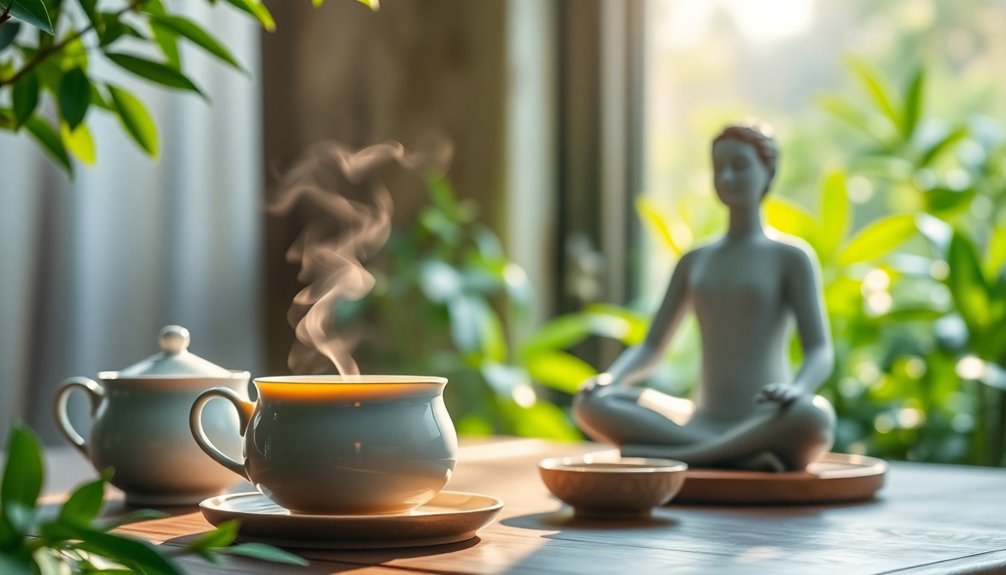
Finding the right tea for your meditation practice can significantly enhance your experience, especially if you're sensitive to caffeine.
If you have caffeine sensitivity, you might feel anxious or restless after drinking high-caffeine teas like black or green tea. To promote relaxation and calmness during meditation, it's best to choose herbal teas, which are naturally caffeine-free. Chamomile and rooibos are excellent options that can help create a tranquil environment, allowing you to focus better on your mind-body balance.
If you still want a little energy boost, consider low-caffeine teas like white tea or certain oolongs. These provide a gentler lift without causing overstimulation. Additionally, brewing the perfect cup of tea can enhance your overall experience by ensuring optimal flavor and aroma, which contributes to a more mindful tea experience.
It's important to monitor how different teas affect your meditation practice. Pay attention to how you feel after each type, as everyone's tolerance to caffeine varies.
Practical Applications
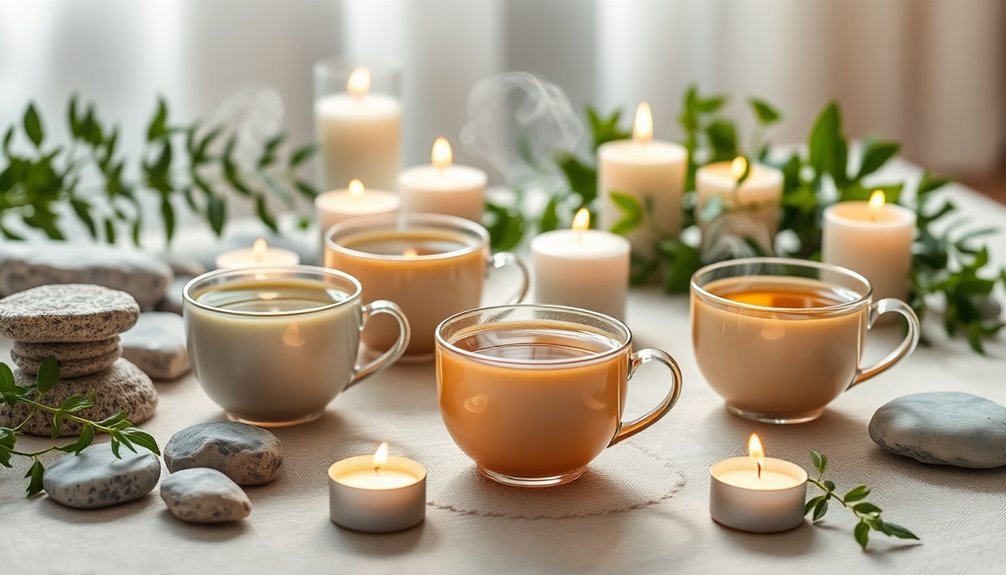
Incorporating tea into your meditation routine can transform your practice, making it more enriching and focused.
Start with matcha green tea, which enhances focus and promotes relaxation. Its high L-theanine content helps you feel calm and alert without any jitters. As you prepare the tea, take a moment to engage your senses—notice the vibrant color and savor the aroma. This mindful preparation fosters present-moment awareness, setting a serene tone for your session. Additionally, practicing positive thinking during your meditation can further deepen your experience.
If you're meditating in the evening, try chamomile tea. It's known to reduce anxiety and promote deeper relaxation, making it easier to settle into a tranquil state. Additionally, the calming properties of antioxidants present in these teas can further enhance your meditation experience.
For a caffeine-free option, consider rooibos tea. Its earthy flavor and high antioxidants enrich the experience, supporting your overall well-being.
Frequently Asked Questions
What Tea Is Good for Meditation?
If you're looking for tea good for meditation, chamomile relaxes you, matcha boosts focus, peppermint sharpens clarity, rooibos calms, and hibiscus balances energy. Each offers unique benefits that can enhance your meditation experience greatly.
What to Drink During Meditation?
When you meditate, consider sipping chamomile for relaxation, matcha for focus, or peppermint for clarity. Rooibos and hibiscus also offer calming benefits. Choose what resonates with you to enhance your mindful experience.
Which Tea Is Best for Mental Health?
When considering the best tea for mental health, you might choose chamomile for relaxation, green tea for focus, or lavender for stress relief. Each offers unique benefits that can help improve your overall mental well-being.
What Tea Is Good for Consciousness?
If you're looking to boost consciousness, consider green tea for focus, matcha for sustained energy, or peppermint tea for mental clarity. Chamomile can calm your mind, while rooibos offers relaxation without caffeine.
Conclusion
Incorporating tea into your meditation practice can truly enhance your experience. Whether you choose calming herbal blends or energizing teas, the right cup can help you focus and relax. Remember to pay attention to your caffeine sensitivity, so you can find what works best for you. By exploring different tea rituals from around the world, you can deepen your mindfulness journey. So, brew a cup, settle in, and enjoy the peaceful moments that follow!

